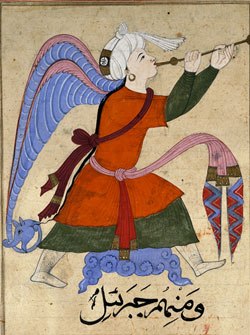
God in Islam: He is the One Creator, the Eternal, the Eternal, Who has neither a wife nor a son, He is not similar to anyone, He has no equal, He is neither numerous nor divided. Muslims also consider God to be a single individual who is free of all attributes. With this initial view of the concept of God, the follower of the concept notes that there are specific attributes within a clear template for God in Islam.
THE FIRST of these attributes is waḥdāniyya (‘monotheism’), and secondly tanzīh (transcendence). But this seems contradictory or weak when we examine Islamic literature and thought as an integrated whole. Beginning with the Qur’ān, the first reference for Muslims, and passing through the books of the Prophet’s Sunna on all its sources, from the Sunna of Aisha and Ṣaḥīḥ al-Bukhārī and Muslim to the narrative of Umm Salāma. In this Islamic literature, we notice a terrible contradiction among Muslims concerning their concept of God and the Islamic view of God.
These views as a whole give a contradictory and conflicting idea, and the adherent of the Islamic religion is plunged into a strange confusion of ideas, with scattered mental and intellectual conceptions, forced upon him by the quantities of contradictions he is confronted with. This contradiction and the way the Muslim mind must deal with it – whether by acquiescing to it or doubting it ultimately engenders patent lapses in the Islamic personality which manifest themselves in the form of violence, self-isolation or takfīr [1] resulting from ignorance and a lack of understanding.
We shall here give some examples of the contradictory deity in Islam:
The Single Transcendent God: The God of the Muslims in general is characterized by individualistic attributes enshrined in basic forms in Sūrat al-Ikhlāṣ
Say: He is God, one (1) God the Eternal (2) He begets not and is not begotten (3) and there is no one equal to Him (4).
We also see the emphasis on The topic of exalting the divine being in many verses, including Sūrat al-Shūrā, in a definitive way: There is nothing like unto Him (11).
The multiple and not-transcendent God: Despite the verses that enshrine the oneness and transcendence of God in Islam, other verses in the Qur’ān cast doubt on the the former. In other places such as at Sūrat al-Mu’minūn verse 14:
So blessed be God, the best of creators
we notice the Muslims’ confusion about the meaning of the verse and the issue of the plurality of deities in Islam. There are many other verses such as Sūrat al-Ṣaffāt 125:
Do ye invoke Baal and abandon the best of creators?
in which we see confusion in attempts to alter the literal meaning of such verses, especially when it comes to the subject of the Arabic language and the ‘clear and unerring speech of God’ and how to interpret the Qur’ān!
The contradictions engender patent lapses in the Islamic personality which manifest themselves in the form of violence, self-isolation or takfīr
We also have verses that contradict the transcendence contained in the Qur’ān, including: “The Most Merciful is on the Throne ascended” (Sūrat Ṭaha verse 5) and Sūrat al-Nisā’ verse 58: “Indeed, God is All-Hearing, All-Seeing”.
In these Qur’ānic sūras, we notice a concept that contradicts the first-mentioned concepts of monotheism and transcendence, ranging from the multiplicity of its levels to the denial of the attributes of transcendence to the likeness with human beings and their traits, all of which are confirmed by the Sunna and the hadith, including many hadiths narrated from the Messenger himself when he describes God.
Here we have to ask the following question: Who is the Muslim who can decide authoritatively on the attributes of God in Islam? Which then are the characteristics that a Muslim must adopt or abandon?
Such problematic topics as these were the origin of disputes and divisions that occurred in the Islamic body concerning the interpretation of the Qur’ān. Not the least of these was the whole story of the esoteric and Muʽtazila sects and their logical or moderate interpretation of the sacred texts!
A weak God: Whoever follows how Muslims act and believe will notice that God in Islam is a weak creature, one who in need of Muslim support and who cannot maintain His divinity without them. It is for this reason that you find them applying what they call ‘God’s commands’ always by force, to the point of killing all those who do not recognize their God, as if God whom the believers claim to be just, has forgotten to inform the other peoples that the true religion is Islam. Therefore the Muslims take on the task of correcting God’s mistakes and omissions vis-à-vis these others in their own way!
Who is the Muslim who can decide authoritatively on the attributes of God in Islam?
In such behaviours, we can see how Muslims marginalize God at every moment and render the conception of HIm as something ridiculous, a conception that turns in the minds of Muslims into a psychological disease and a source of terror and fear for others.This weak God judging from the actions of Muslims is a source of terror for those outside of their narrow circle! Even in the Qur’ān, we notice God’s need for their achieving victory in many places. For example, we read in the following Sūra Muḥammad verse 7:
O you who believe, if you help God, He will help you and make your feet firm
The Powerful God: At the same time as sensing in the Muslims’ faith the weakness and fragility of God without their help, you read that He is the pinnacle of strength and ruthless force! In Sūrat al-Najm verse 5 we read that “His knowledge is of the mighty powers” with it remaining unclear as to who this verse refers to – God or Gabriel – does this verse refer to the power of God or to His Angel that He sent down? If God is the pinnacle of power and ruthless force, why do the believers insist on applying His rulings and securing His victory with swords? Does God, the All-Powerful, need the scrap iron of Muslim swords and knives in order to maintain His Lordship?
The Tolerant God: At the same time that the God of Islam appears with strength and ruthless force, other passages in Muslim books maintain that God is Forgiving and Merciful! How can the tolerant individual discern when God is in a good mood or not, to know whether He will forgive or punish him? This contradiction in the concept reaches its ultimate in Sūrat al-Mā’ida verse 98 where we read:
Know that God is severe in punishment and that God is forgiving and merciful.
How will the believer be able to distinguish the severity of punishment from the mercy and forgiveness contained in the same verse?
The Hateful God: In the same arena of contradiction the books of Muslims inform you of the extent of God’s deceptiveness and how no one is able to outwit God and that He has the power to ruthlessly compel those who oppose him, and that in the best cases He “gives respite, but never neglects”. And here we can only give an example of a God who creates beings and leaves them to persevere in their transgression until He tortures them on the Last Day. So what sort of mentally ill God is this? Humans are thus created only in order to hold them accountable on the Day of Resurrection in the worst imaginable forms of endless waiting, cramming together, intimidation and terror?
The Sadistic God: Whoever reads Islamic literature on the ‘Torment of the Grave and the Last Day’ will see just how much sadism exists in Islamic thought, alongside levels of torture that outclasses that of ancient times or the pagan era! Judging from the two hundred hadiths in the Ṣaḥīḥ Muslim and Ṣaḥīḥ al-Bukhārī stressing the Torment of the Grave and the horrors of the Day of Resurrection, we can a level of sadism unparalleled elsewhere, from the two angels torturing the dead in his grave to his being beaten around the head with a rod of iron, so that all creatures bar the human being can hear the suffering of the grave, or other images such as th great Gathering on Judgment Day where mortals are suspended naked with ropes tied around their sensitive areas. All of this indicates a sadistic mentality that cannot be part of any religious or spiritual inclination!
Terrifying levels of contradiction found in the Qur’ān regarding the concept of God are enough to produce a mentally ill personality
These themes, in which we have reviewed some aspects of God and His attributes as they appear in in Islamic literature, point to a distorted concept of God. It is a concept that is contradictory in terms of how much space it occupies in the books of Muslims. There is the contradiction between vehemence and supernatural force and the ultimate in mercy and kindness. This of course explains the sheer quantity of contradictions and progressive fanaticism of the Muslim personality. Among Muslims you can observe the extremes they can go to in killing others, even other Muslims, merely for their having disagreed with them, and how they do this by relying on texts from the Qur’ān itself. At the same time, you can also find moderate balanced Muslims, who also base their way of life on texts from the Qur’ān.
Thus it is that the terrifying levels of contradiction found in the Qur’ān regarding the concept of God are reflected in the Muslim’s personality, enough to produce a mentally ill personality. They can range between takfīrīs and moderates in their clear confusion concerning one and the same issue in the Qur’ān. Each side deals with the issue according to the texts that it deems appropriate, and these are always taken from the Qur’ān.

Suggested Reading
You can see this confusion and contradiction in the Qur’ān in all things, not merely in the conception of God. You can see it in the stance towards Christians and the People of the Book.[2] You see it in many passages, and it is these instances that are the cause of distortion in the personality of the Muslim and its tendency towards intransigence and takfīr and the existence of problems everywhere that Islam exists in the world.
Yet with all this, what is noticeable is that Muslims are always ‘oppressed’ and that the ‘truth’ is always on their side. Their mental illness has gone beyond all limits to leave them entirely disconnected from reality!
Who will be able to liberate Muslims from this defect in the mind. Who can save the conception of God from the minds and books of Muslims? The idea of God in the Muslim mindset is a distorted idea centered on a criminal, sadistic, and mentally ill person, one who is volatile in His moods, but whose danger is not limited to that, since His mental illness has become reflected in the minds of Muslims themselves and made them mentally ill, in need of quarantine and treatment.
Together, we need to add rationality to Islam’s religious texts and save what can be saved from the degenerative wreckage bequeathed by Islamic thought in the personality of the Muslim. Together we need to liberate God and his distorted conception from the grip of Muslims!
[1] On this see Glossary under takfīr
[2] On this see Glossary under Ahl al-Kitāb

subscript – left
